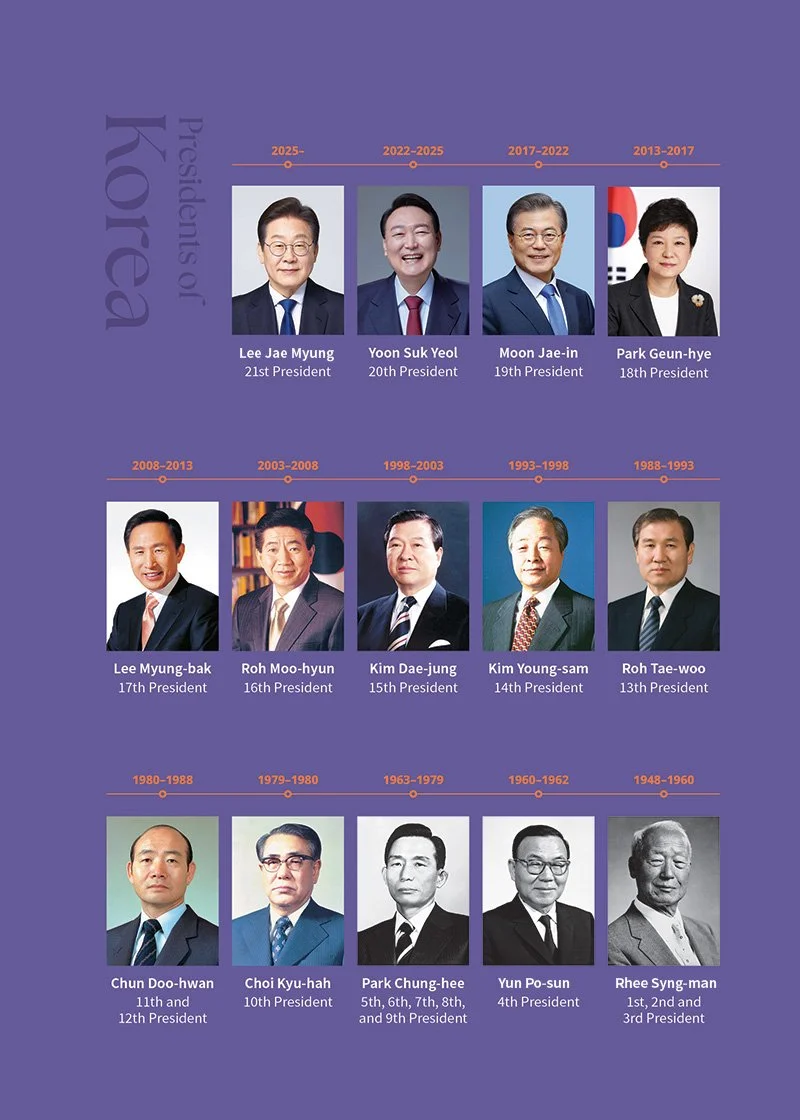
The government of the Republic of Korea was launched on August 15, 1948. Three months earlier, the first 198 members of the National Assembly had been elected in the country’s first general election held under UN supervision. On July 17 of the same year, the first National Assembly promulgated the Constitution. Its members elected Rhee Syngman as the first President on July 20. Rhee Syngman was widely known both inside and outside of the country as a leader of the country’s independence movement. The 3rd UN General Assembly held in Paris in December of that year passed a resolution that the government established in the south of the 38th parallel was the only legitimate government on the Korean Peninsula.
South Korea’s Constitution was promulgated on July 17, 1948 after a month and half of work for its enactment. The government observes it as a national holiday. The first amendment to the Constitution was made in July 1952, while the 9th and last amendment was passed by referendum on October 27, 1987.
The country’s Constitution adopts liberal democracy as the basic principle of governance. The Constitution guarantees the people’s freedom and rights under various laws. It also guarantees equal opportunities in all sectors, including politics, economy, society and culture, and recognizes the necessity of establishing a welfare state. The Constitution also stipulates that all people have the obligation to pay taxes, engage in national defense, educate their children, and work.
The Constitution states that the country should endeavor to maintain international peace. It stipulates that international treaties signed and promulgated by the country and generally accepted international laws have the same effects as domestic laws. Under the Constitution, the status of aliens is guaranteed in accordance with international laws and treaties.
Korea Information - Government
Executive, Legislative, and the Judiciary

The National Assembly of the Republic of Korea is the unicameral national legislature of South Korea that represents the people’s opinions. All the laws of the country are made by the National Assembly. At present, the members serve fouryear terms. The first National Assembly was launched on May 31, 1948.
The National Assembly Proceeding Hall is located in Yeouido near the Hangang River that flows through Seoul. The National Assembly is composed of 253 members elected in local constituencies and 47 members elected through proportional representation. The latter are meant as a means of bringing persons with specific professional expertise into the assembly.
The term of office of the President shall be five years, and the President shall not be reelected. The State Council, usually referred to as the "Cabinet meeting" shall deliberate on important policies that fall within the power of the Executive.
The President shall be the Chairperson of the State Council, and the Prime Minister shall be the Vice-Chairperson. If the office of the presidency is vacant or the President is unable to perform his or her duties for any reason, the Prime Minister controls the ministries of the government on his/her behalf. The Judiciary of the government is composed of the Supreme Court, appellate courts, district courts, family courts, administrative courts, and the patent court among others. The Supreme Court Chief Justice is appointed by the President with the consent of the National Assembly, and other Supreme Court justices are appointed by the President upon the recommendation of the Chief Justice. The term for the Chief Justice and justices is six years.
Korea Information - Government
Independent Organizations

Besides the Executive, Legislature, and Judiciary of the government, a number of other agencies carry out their respective independent functions.
The Constitutional Court of Korea is an independent and specialized court. Its primary role is reviewing constitutionality under the Constitution of the Republic of Korea in conjunction with administrative law functions such as giving final decisions on impeachments and making judgments on the dissolution of political parties. Nine Justices serve on the court. Three of the positions are appointed directly by the President. Of the remaining six positions, three are appointed by the Chief Justice of the Supreme Court, and three elected by the National Assembly. The President of the Constitutional Court is appointed by the President with the consent of the National Assembly.
The National Election Commission an independent constitutional body, whose main tasks are managing elections for public office and affairs related to political parties and political funds. The term of office of the members of the Commission shall be six years, and they shall not join political parties, nor shall they participate in political activities. The chairman is elected from among the members.
The National Human Rights Commission of Korea (NHRCK) the independent commission intended to realize the dignity and value of human beings as sovereign individuals by protecting, advocating and promoting their fundamental human rights. The commission was launched in November 2001 to reflect the people’s earnest desire for the improvement of the country’s human rights conditions revealed during the past democratization process. It also deals with human rights violations and discriminatory acts received by foreigners residing or working in South Korea.
Korea Information - Government
Local Government

South Korea adopted the local autonomous system in June 1995. The Local Autonomy Act was enacted in 1949, but the act ceased to have effect or the election was postponed through political upheavals including the Korean War, the April 19 Revolution, and the May 16 military coup d’état.
Local governments are divided into high-level and low-level local governments. With the inclusion of the Sejong Special Self-Governing City in July 2012, the number of high-level local governments increased to 17 (i.e. Seoul Special City, six metropolises, eight provinces, and Jeju Special Self-Governing Province). The number of low-level local governments stands at 226 (75 cities (si), 82 counties (gun), and 69 districts (gu)).
Local government heads and local council members are elected by direct popular vote for a four-year term. The head of the local government can be reelected for up to three terms. There is no limit on how many terms a local councilor may serve. The local autonomous system is very significant as a means of realizing the goal of grassroots democracy through local residents’ participation.
Korea Information - Government
International Relations

South Korea strives to promote friendly and cooperative relations with other countries. As of June 2020, South Korea maintains diplomatic relations in 191 countries in total. Among them, the government manages 115 resident embassies, 5 permanent missions, and 46 consulate generals. The consulate general provides consular services in a country where the embassy is established. The permanent mission serves to assist in the realization of the purposes and principles of the international organizations. In addition, 42 Korean Cultural Centers are operated in 32 countries to promote South Korean culture.
South Korea is committed to carrying out positive activities as a member of diverse international organizations such as UNESCO, IMF, APEC, IAEA, ILO, WHO. South Korea became a member of the UN in 1991, and joined the OECD in 1996. The country has also engaged in various activities as a member of the IOC since 1947.
South Korea serves as a member of the international community through international cooperation carried out at the government level and through voluntary activities by private organizations. (Photo: South Korean COPION volunteers with locals in Kathmandu, Nepal)
International Cooperation
South Korea does its best in the sector of international cooperation in keeping with its enhanced economic strength. The country takes part in programs designed to provide support for impoverished countries through the World Bank, the IMF, and the OECD. Recently, the country has also joined worldwide efforts for peacekeeping, global economic stabilization, environmental conservation in response to global warming, etc.
South Korea chaired the G20 Summit held in Seoul in November 2010, confirming its status as a leading country, under the slogan “Shared Growth Beyond Crisis.” Observers said that the country dealt very efficiently with foreign exchange issues, the core agenda during the global economic crisis.
The Nuclear Security Summit Seoul 2012 was another event that showed the status of South Korea playing a key role in the struggle for world peace. 53 world leaders and 4 heads of international organizations participated in the summit to discuss measures for further strengthening international cooperation to block nuclear terrorism.
In December 2014, the ASEAN-ROK Commemorative Summit was held in Busan. This summit was intended to further deepen trust and partnership between the Republic of Korea and the Association of Southeast Asian Nations (ASEAN), commemorating the 25th anniversary of ASEAN–ROK dialogue relations. As a follow-up to the summit, the ASEAN Culture House opened in September 2017 in Haeundae-gu, Busan.
South Korea is enhancing its reputation in the international community by achieving notable results in the green growth sector. The country has hosted the UN Green Climate Fund (GCF) designed to limit or reduce greenhouse gas (GHG) emissions in developing countries, and to help vulnerable societies adapt to the unavoidable impacts of climate change. In addition, the Global Green Growth Institute (GGGI) is also headquartered in Seoul.
Provision of Support for Developing Countries
The 4th High Level Forum on Aid Effectiveness, the largest-scale international meeting in the development and cooperation sector, was held in November 2011 in Busan, the second largest city of South Korea. This showed the phenomenal success story of South Korea which transformed itself in only half a century from one of the most impoverished countries in the world into a donor capable of providing aid to other countries.
South Korea’s foreign aid programs are coordinated by the Korea International Cooperation Agency (KOICA). Since its establishment in 1991, this agency has fulfilled a variety of programs designed to provide support for developing countries, thereby increasing global understanding and awareness of South Korea. KOICA provides ODA (Official Development Assistance) of USD 400–500 million annually for developing countries in Asia and Africa; these funds contribute to numerous areas including education, health, agriculture/forestry/ fisheries, public administration, and industrial energy, among others.
South Korea is also willing to make a great contribution to world peace and security through participation in a wide range of UN peacekeeping operations and support for the UN peacekeeping budget. Currently, South Korean troops are stationed in eight countries including Lebanon, South Sudan, India, Pakistan, and Western Sahara, where they are tasked with maintaining order, rehabilitation, medical services, and other activities.

